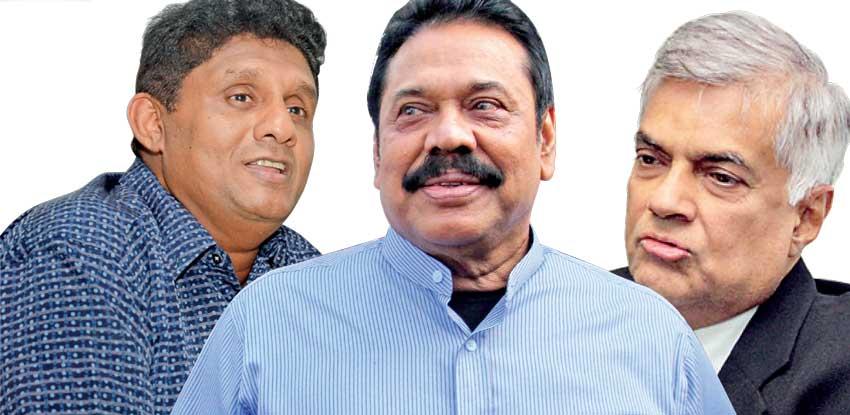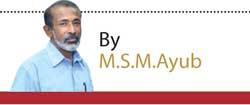Reply To:
Name - Reply Comment

As a party that relies on the powers of the President for everything, the SLPP would not do away with the executive Presidency. What really they mean is to amend some Articles of the 19th Amendment possibly along with some others
All in the SLPP ranks are not convinced of getting the special majority or 150 out of 225 seats in the House
 Generally, all political parties would sing their own praises during elections and bet on their victories. Small parties predict their victories on electorate level or regional level as the case may be, while the parties that are really national or perceive themselves to be national would foretell that they would form the next government.
Generally, all political parties would sing their own praises during elections and bet on their victories. Small parties predict their victories on electorate level or regional level as the case may be, while the parties that are really national or perceive themselves to be national would foretell that they would form the next government.
This is a psychological influence - a “Psy Op” in military terms- on the electorate, as a particular party’s or a candidate’s visibility or possibility of winning is an influence on the voter to vote for that party or the candidate. A large majority of people in any country would think twice before voting for a party that would definitely lose, even if its policies and activities are highly laudable.
If they remove the term limit of the President, as they did in 2010, who would be the SLPP candidate at the next Presidential election -Mahinda Rajapaksa or Gotabaya Rajapaksa?
However, the case with the Sri Lanka Podujana Peramuna (SLPP) this time seems to be different as they claim that they would form the government on August 6 with two-thirds majority power in Parliament, instead of just winning the election. Yet, it is clear that all in the SLPP ranks are not convinced of getting the special majority or 150 out of 225 seats in the House, though the entire party is extremely confident of the victory at the Parliamentary election that is scheduled to be held on August 5.
Some among the ranks of the SLPP seem to really believe that the party would get more than 150 seats. The reasons are diverse. The calculation of a section of the party is based on the leap in its popular support from 4.9 million votes at the local government elections in February, 2018 to 6.9 million votes at the Presidential election held on November 16, last year. They have been further encouraged to believe in an unprecedented victory this time due to the split in the United National Party (UNP), their main rival.
A large majority of people in any country would think twice before voting for a party that would definitely lose, even if its policies and activities are highly laudable
An impression of the SLPP getting two thirds majority has been created in the minds of another group in the party like what happened to Mullah Nasruddin, the famous Turkish satirist lived in 13th century, in one of his stories. Nasruddin in that story falsely touts about his cow with a view to sell it at a higher price at the market and later takes it home again, believing his own lies. Similarly, the perception of getting two-thirds majority has been created in the minds of this group of people by the repeated and unceasing touting by their leaders on the matter.
However, it would be very difficult, if not impossible for any party to secure two-thirds of seats in Parliament at an election, under the current Proportional Representation (PR) electoral system, even if it gets two-thirds of the votes, at the national level count. On the other hand, unlike under the First-Past-the-Post system, divisions in other parties would not offer any extra benefit to a party under the PR system, as the number of seats it would secure would depend on the votes it obtains and hence remain static. Nevertheless, needless to say the division in a party would be a psychological impact on the voters of that party and that would in turn be helpful to other parties.
It would be very difficult, if not impossible for any party to secure two-thirds of seats in Parliament at an election, under the current Proportional Representation (PR) electoral system, even if it gets two-thirds of the votes, at the national level count
The leaders of the SLPP are calling on the electorate to give them a special majority in Parliament in order to amend the Constitution, especially to “undo” the 19th Amendment to it. Most probably the party would have to buy over MPs from the United National Party or the Samagi Jana Balavegaya (SJB) led by former Opposition Leader Sajith Premadasa to achieve this, if they win the election. Under the present political culture it would not be difficult.
Yet, totally repealing the 19th Amendment, as the impression that the SLPP leaders have created in the minds of the people, especially in their supporters is an impossible task, since it even includes the duties, powers and functions of the President. As a party that relies on the powers of the President for everything, the SLPP would not do away with the executive Presidency. What really they mean is to amend some Articles of the 19th Amendment possibly along with some others.
19th Amendment was a half-way journey towards the abolition of Executive Presidency and it created two almost equal power centres in the form of President and Prime Minister. Yet, even most learned people realize this when it was adopted, since a strong mindset against the executive Presidential mode of governance prevailed in the country, towards the tail end of the Mahinda Rajapaksa regime. The two power centres had in turn created a messy situation during the so-called Yahapalana government or the government led by President Maithripala Sirisena and Prime Minister Ranil Wickremesinghe, inevitably demanding another change.
The SLPP and its allies demonize the 19th Amendment now as if they had opposed it since its inception. In fact, none of the former MPs who are now in the SLPP - except for Sarath Weerasekara - voted against it, when it was passed in Parliament on April 28, 2015. Seven Rajapaksa loyalists were absent from the House while all others voted for the Amendment. They either accepted the contents of it or voted for it in fear of new executive President Maithripala Sirisena.
The question remains as to what would be the changes the SLPP leaders consider to bring in to the Constitution if they get the two thirds majority at the election or secure that power in Parliament by way of buying over MPs from other parties. Going by the track record of the leaders of the SLPP, they might prefer to abolish the independent commissions to do away with the restrictions imposed on the President, as they did in 2010 with the 18th Amendment to the Constitution.
However, will Mahinda Rajapaksa as the Prime Minister even after the August 5 general election agree then to Constitutional amendments that would prune his powers and turn him into a figurehead? If they remove the term limit of the President, as they did in 2010, who would be the SLPP candidate at the next Presidential election -Mahinda Rajapaksa or Gotabaya Rajapaksa?
One cannot contest the fact that the 19th Amendment had elements in it that are very important for democracy, such as the Articles pertaining to Right To Information (RTI) as well as independent commissions and a mechanism to challenge the high-handed activities of the President before a court of law, despite it also containing elements that might create a chaotic political situation in the country, as we witnessed during Maithri-Ranil administration.
If the government decides to do away with such democratic elements as well along with the detrimental elements, that would amount to throwing the baby out with the bathwater and would be disastrous for the country. 19th Amendment was a flawed remedy for a malady – the unchecked powers of the executive. That does not mean that the only option people have now is to embrace the malady again. One should not replace the faulty remedy with the malady, instead finding a new appropriate remedy.